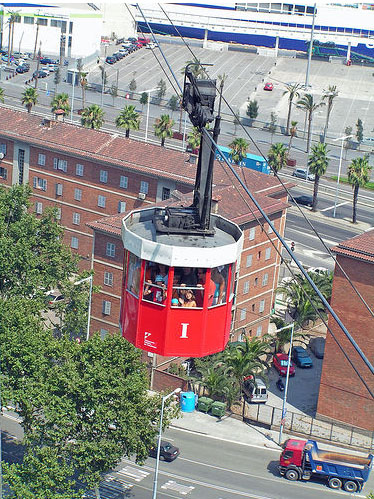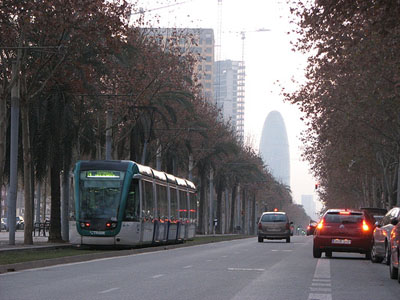Beijing outspent Barcelona, host of the 1992 Olympics, by more than $23 billion on infrastructure alone.
In a recent New
York Times article, Mayor Richard M. Daley was
asked if
Chicago would be attempting to match
Beijing
’s expensive new
infrastructure and costly opening ceremonies if chosen to host the 2016 Olympic
Games. While
Beijing ’s preparation for this
summer’s Olympic Games is impressive, according to Daley, it isn’t the example
appropriate for
Chicago
. Looking for an Olympic best
practice, Mayor Daley cited
Barcelona
instead – a city that revitalized its
waterfront and left a successful lasting legacy long after hosting the 1992
Summer Games.

Photo by Colin
Mackay
Beijing spent a record $26.4 billion on
transportation and other infrastructure to build a much needed airport terminal,
light rail line, and bus rapid transit (BRT) network for the Olympics. Barcelona spent
comparatively less in 1992; for $3.38 billion, the city mainly focused on
upgrading its existing infrastructure – such as subway stations – but did
construct significant projects such as a 48-mile ring-road system and a new
airport terminal. To move visitors through the city, Barcelona extensively
reconstructed its cable cars to connect with Olympic venues, lengthened trains
and increased frequency on the Metro underground transit system, and dedicated
24 miles of lanes for authorized Olympic vehicles.

Photo by James
Alaksen
London, like Barcelona, plans to use
much of its current infrastructure to accommodate the influx of people during
the 2012 Games. London’s bid committed $30 billion to
transportation spending. While upgrades and improvements to its current
train, track, bus, and station infrastructure are included as part of that
budget, the city is building a high-speed Channel Tunnel Rail Link (CTRL) and is
extending the Docklands Light Railway (DLR) 3.7 miles into the heart of the
Olympic Park.
Chicago admires Barcelona’s ability to leave a meaningful legacy, is in awe
of Beijing’s lavish display, and eagerly
anticipates London’s opportunity to shine in the Olympic
spotlight. While Chicago is no stranger to large-scale events
and is accustomed to moving millions of people in and out of the city, hosting
the Olympics would require better transportation connections throughout the
region, as well as solid investments to upgrade our aging transit system.
Imagine the possibilities for Chicago in 2016: High-speed airport express
trains? Dedicated bus lanes? A citywide BRT network? New railcars, stations, and
real-time information for passengers? Winning the Olympic bid presents
the opportunity to impact, shape and guide the future development of Chicago as a global city.
Our bid needs to be stirring and forward thinking, which means finding real
dollars to make actual change to our infrastructure. The time is
now.
This article was featured in Talking
Transit, MPC’s bi-weekly e-newsletter. To receive the newsletter, email talkingtransit@metroplanning.org
with ‘Subscribe’ in the subject line.